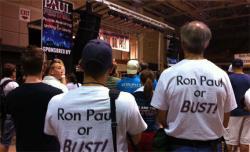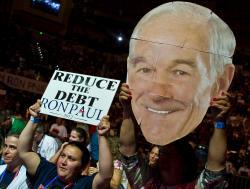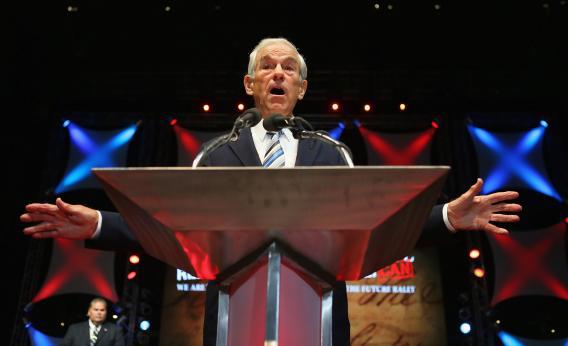TAMPA—The Ron Paul RepubliCAN “We Are the Future Rally” breaks the first rule of campaign events—pack the front rows. The University of South Florida Sun Dome, which seats 10,411, is full-up in the second and third decks. The bottom deck isn’t full. Easily more than 100 seats, in clean view of TV cameras, are empty, even when the noon start time arrives. Those seats were supposed to be for Republican National Committee delegates. There were supposed to be more of them.
“We welcome you, delegates!” says our MC, presidential family historian and Paul diehard Doug Wead. Alas, “some are so traumatized that they aren’t even coming here.” They’d been “locked out, lied to, told that the ‘nays’ have it when we can all see on YouTube that the ‘ayes’ have it.”
Everybody boos; everybody knows. The big boys down the road, at the convention center, need to be shamed and exposed and shamed some more. Ron Paul supporters are not immune to paranoia, and in rooms all over Tampa, they are trading rumors about the ways their movement is being screwed. Did you hear that they kicked out all our delegates? The RNC sent out a message that this rally was cancelled. And so on.
They’re right to be confused. This stuff is confusing. Paul’s third, and probably final (he’s 77), presidential bid ended with zero primary or preference poll wins. Thanks to proportional representation, he managed to grab a bunch of delegates in places like Rhode Island and Vermont and Virginia.
Then Paul’s movement seriously knuckled down. Throughout the spring and summer of 2012, Paul supporters swarmed state Republican conventions and precinct-county-district-state caucuses, scooping up delegates that lazy media counts had assigned to the “winners” of the preference-poll states. Iowa. Minnesota. Colorado. Maine. They needed pluralities in five state delegations in order to nominate Ron Paul from the convention floor on the first ballot. They failed.
Other presidential campaigns have gotten much further, then folded. But Paul’s people kept up hope. Maybe they could influence the Republican platform. Maybe they could scoop up uncommitted delegates and nominate Paul anyway. Maybe they could force the convention to a third ballot—which would free up delegates to look into their souls and vote for Dr. No.
This hope is alive in Tampa, exacerbated by blurts and shouts and tweets of new proof that the Paul delegates are getting screwed. The Paul movement has largely gathered in two large rallies, a few thousand people at each—“We Are the Future” at the Sun Dome, the P.A.U.L. Festival at the Florida Fairgrounds. (People Awakening and Uniting for Liberty, if you were wondering.) Paul would only speak at the first rally, a tightly controlled five-hour lectures-and-music session. The second, a three-day freedom-palooza, let in everybody—Scientologists, the John Birch Society, authors of self-published books about the healing powers of oregano, and the Libertarian Party. (Paul’s not speaking at the Republican National Convention itself. He declined to “fully endorse” Mitt Romney.)

Photograph for Slate by David Weigel.
The common theme: Ron Paul could still win, if these bastards didn’t keep taking delegates away. A group of Maine delegates walked around PAUL Fest in matching baseball caps, explaining how the state party had taken half their votes away in a series of arguments before the larger, pro-Romney Republican National Committee. It was so rotten, such obvious cheating, that Maine’s Republican governor was refusing to come to Tampa.
“The rationale is that there was ‘lax security’ at the convention,” said Ashley Ryan, 21, a Paul supporter who’s become the nation’s youngest RNC member. (Each state has two of them.) “Here’s the funny thing about that. The people in charge of security at the convention were on the state committee. My own mother checked me for ID at the convention, which should tell you something about how ‘lax’ it was.”
This is what outsiders don’t understand: Oodles of Paul supporters believe that the delegate switch-ups literally cost them a chance at the nomination. James DiPasquale, a Florida activist who watched some friends try and fail to become delegates, argues that Paul could win if the contest stretched on for a few ballots. (There has been no multi-ballot convention for decades.) “If every delegate was allowed to vote his conscience,” he asks, “how many of them really would want to vote for Romney? It would be a landslide for Ron Paul.” To emphasize the point, he walks around with a life-size stand-up poster of Ronald Reagan, to which he’s attached a quote from the Republican demigod, praising Paul.
And then there are Paul fans who want to move on. There are legitimate reasons. Paul won only 10 percent of the GOP primary vote, after all, and around 10 percent of the delegates if you round up. The Libertarian Party’s investment in PAUL fest comes with speeches from their presidential ticket, former Gov. Gary Johnson and former Judge Jim Gray. On Saturday afternoon, I see his most famous Republican backer, the legendary Nixon fixer Roger Stone, dressed in a purple polo shirt, explaining how the GOP might alienate Paul fans by taking the delegates away. “I can’t imagine why any voter would vote for Mitt Romney!” Eventually, surely, that’s got to help out his guy Johnson. Right? Doesn’t it?

Photo by MLADEN ANTONOV/AFP/GettyImages.
I join Gray and walk past the booths to the vast concrete hangar where Johnson’s going to speak. “Some of these supporters are avid,” he says, half-admiringly, half-frustrated, “and they’re holding out hope that Paul will be the Republican nominee.” He settles in backstage; I stand behind two men wearing “Ron Paul or Bust” T-shirts. Johnson’s strategy for winning over the crowd: solidarity with the angry delegates.
“This is an exclusionary process, and each and every one of you know it,” he says. “You’ve had sand kicked in your face again and again!” That gets huge cheers. They are less huge when Johnson says he’s the “only other candidate” on the ballot with Romney and Obama, and that he’s been given a rare chance to carry the torch of liberty. A blond woman in a sundress right next to me is overcome. She wants to scream. And then she does. “Give it to Paul!”
On Sunday, at the official Paul party, I’m reminded of all the reasons it’s hard to imagine Paul’s people backing someone else. They’ve come to adore the guy. They cheer at video clips of Paul quoting Friedrich von Hayek to Ben Bernanke and Alan Greenspan. They tote copies of the Ron Paul family cookbook, an old promo brochure from the trail. The speakers—chosen by Paul—pay tribute to their friend as if he’s being buried with the Oscar and six gold medals he just won.
“He’s the one congressman who can actually be described as ‘the honorable,’ ” says the old Paul aide Lew Rockwell, chairman of the Ludwig von Mises Institute, proprietor of LewRockwell.com
They had to cancel it. If they held it, only the Ron Paul people would show up.
“He is our Gandhi,” says Wead. “He is untouched.”
“When he calls it’s like Mises calling me,” says Walter Block, an economist at that think tank. “It’s like God calling me.”
God arrives onstage shortly before 5 p.m. He’s a little modest, giving the movement the credit, denying it to himself. “One paper in Washington had a headline, ‘The Revolution Will Not Be Happening,’ ” he says. “Don’t they wish!” But actually, what the Washington Post had claimed was that “The Ron Paul Revolution Will Not Be Happening.” He politely redacted his own name. He seems to be moving on, past the whole idea of getting the Republican nomination.
Almost.
“Ultimately, numbers do count,” says Paul. “And numbers do count even when they don’t count all the votes as well. Because we do have the numbers!”
